Escape from the dark of winter in these seasonal reads
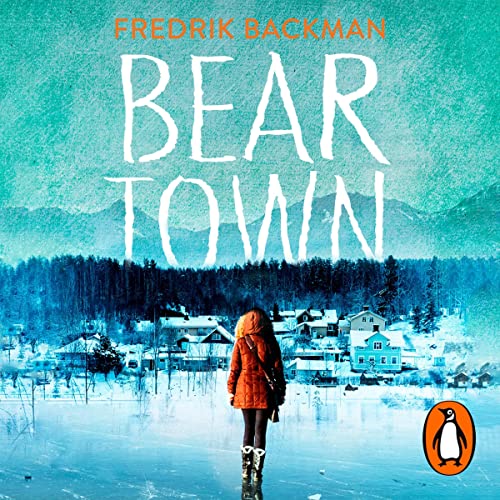
Winter, as an idea, presents an interesting dichotomy. Its dangerously cold winds freeze the ground and its snow blocks out the sun, yet it has become a time for countless celebrations. Because of this, a “winter book” isn’t necessarily one clear-cut genre, but rather a loosely defined group of ideas that covers everything from revenge stories to Hallmark romances.
Small-town Scandals
On the coldest days of the year, I find myself hiding from the world. Going outside, even if it is only to walk to my car and drive to a friend’s house, is out of the question. Now, what if this were all year round? Places, not just people, experience this loneliness, and some places experience this all the time. Whether it is actually due to the cold or something else, small towns and their isolation may feel a little bit familiar to anyone who has had to brave a winter day.
Beartown by Fredrik Backman
Goodreads description:
“People say Beartown is finished. A tiny community nestled deep in the forest, it is slowly losing ground to the ever encroaching trees. But down by the lake stands an old ice rink, built generations ago by the working men who founded this town. And that ice rink is the reason people in Beartown believe tomorrow will be better than today. Their junior ice hockey team is about to compete in the national semi-finals, and they actually have a shot at winning. All the hopes and dreams of this place now rest on the shoulders of a handful of teenage boys.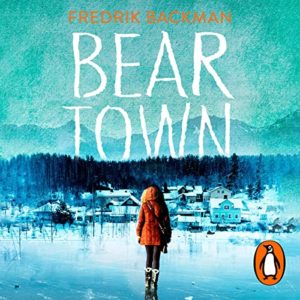
Being responsible for the hopes of an entire town is a heavy burden, and the semi-final match is the catalyst for a violent act that will leave a young girl traumatized and a town in turmoil. Accusations are made and, like ripples on a pond, they travel through all of Beartown, leaving no resident unaffected.
Beartown explores the hopes that bring a small community together, the secrets that tear it apart, and the courage it takes for an individual to go against the grain. In this story of a small forest town, Fredrik Backman has found the entire world.”
Review:
In history last year, our class talked about how, although a spark may set off a chain of events, there are always other causes stirring in the background, waiting to be ignited. It is only because of these that a single tragedy can lead to countless more. I think of this whenever I read Beartown by Fredrick Backman, because it is a story not just about the spark, but also about the desperation and alliances which push the town towards inevitable conflict.
Furthermore, it delves deep into how the event affects everyone in the community, from students to the bikers at the local bar. Oftentimes, the dismissal and persecution of victims are solely attributed to misogyny and stupidity, and while this is extensively addressed in this book, Beartown also introduces what is, to me, a much more interesting take on why it happens, and specifically why it happened in Beartown. The people in this town all have a stake in this situation, and therefore it’s not just that they believe the events of that day to be a lie, it is that they want to believe it is a lie.
In 2020, this book was adapted into a TV show of the same name, but I think that part of what makes Beartown a great book is how it utilizes the strength of the written word to create a much deeper understanding of the story. While it slows down the pace, by writing from multiple points of view, even if certain characters only tell a very small portion of the story, Backman creates characters both lovable and hateable who all have fleshed-out motivations and stories. And not only are the individuals incredibly real, but the town as a whole feels a bit like a character both whole and multifaceted, too.
However, their individual stories are not so individual. They all build on each other like a wave climbing towards the sky, or an orchestra growing louder and louder in a crashing crescendo, and yet the book and its climax revert back to a still ocean or quiet piano. It may not be an ending as dramatic as the buildup, and yet it also is the only ending that really feels right for the story.
Full transparency, Beartown is one of my favorite books, so it is difficult for me to critique it objectively, but I do think that it is a book that is not only wonderfully written and enjoyable, but it covers topics that I think are important for people to read about.
Hallmark Christmas movies
Nothing says winter like a good old-fashioned Hallmark movie. They may not be very good, but I’m not so pretentious that I can’t enjoy them anyways. Sometimes, all that you need is something cheesy and sweet, and that goes for books, too.
Always, in December by Emily Stone
Goodreads description:
“It started with a letter. It ended with a love story.
Every December, Josie posts a letter from her home in London to the parents she lost on Christmas night many years ago. Each year, she writes the same three words: Missing you, always. But this year, her annual trip to the postbox is knocked off course by a bicycle collision with a handsome stranger–a stranger who will change the course of Josie’s life.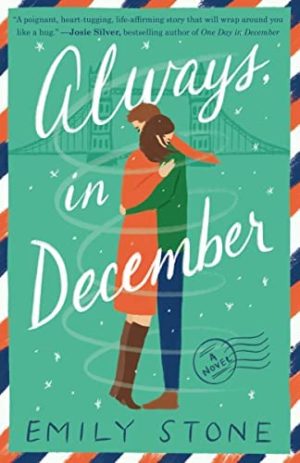
Josie always thought she was the only one who avoided the Christmas season, but this year, Max has his own reasons for doing the same–and coincidence leads them to spending the holiday together. Aglow with new love, Josie thinks this might be the start of something special.
Only for Max to disappear without saying goodbye.
Over the course of the next year, Max and Josie will find that fate continues to bring them together in places they’d never expect. New York City. Edinburgh. The quiet English countryside. And it turns out, Max had every reason to leave and every reason to stay. But what does fate hold for Josie and Max as Christmas approaches again?
A devastating, romantic, life-affirming love story, Always, in December will stay with readers long after they’ve finished the last page.”
Review:
Frankly, I expected this book to be cliche and predictable, but that doesn’t mean that I expected to hate it. Rather, I thought that Always, in December, like a Lofthouse cookie, would still be fun despite, or maybe even because of, its flaws. I was entirely prepared to enjoy the archetypal characters and meaningless platitudes just as I enjoy the powdery, artificial flavor of those cookies, but I was not quite prepared for just how wrong I was.
It had a promising start – I’ll give it that – with an initial meeting that was sweet and insta-love-y in a cute way. The plot twist, while it could have been more interesting if it had been revealed earlier, also wasn’t too bad.
However, it went downhill fast. I struggled to find any reason for the main character to be so caught up on the love interest. They were nice together, but there wasn’t any chemistry worth pining after each other for so long, and the awkwardness of their later interactions killed any interest I had.
Always, in December should have been a book I enjoyed, and yet it kept missing the mark. I feel a bit bad for criticizing the book for being what I said I wanted, but the predictable twists and underdeveloped side characters were too much for me. Maybe, like how Lofthouse cookies might lose their charm after eating a whole box, there are simply some things that are acceptable in short 90-minute movies but not in a 400-page novel. I think that my dissatisfaction was largely due to the fact that this book fell into the awkward middle ground in terms of the tone and plot.
The book may have been better if Stone had committed to either leaning into the cliche elements in order to make charming stylistic choices or away by subverting tropes. Instead, by straddling the line, she almost created an uncanny valley effect, where it was unclear how much I was supposed to think about the book. I could neither turn my brain off and have fun, nor could I think too much about it without cringing at certain parts.
Folklore-based
Admittedly, the association I have between folklore and winter is a bit abstract, but it might help to first describe what folklore means to me. What makes folklore different from myths? Really, they are the same thing, and yet they carry such different images in my mind. If a myth is a world-changing story of gods and demons, then folklore is a quaint story where everything is maybe just a bit stranger and more magical than life is. It is the crackling fire in a winter forest – familiar and constant, hopeful and warm.
The Bear and the Nightingale by Katherine Arden
Goodreads description:
“At the edge of the Russian wilderness, winter lasts most of the year and the snowdrifts grow taller than houses. But Vasilisa doesn’t mind—she spends the winter nights huddled around the embers of a fire with her beloved siblings, listening to her nurse’s fairy tales. Above all, she loves the chilling story of Frost, the blue-eyed winter demon, who appears in the frigid night to claim unwary souls. Wise Russians fear him, her nurse says, and honor the spirits of house and yard and forest that protect their homes from evil.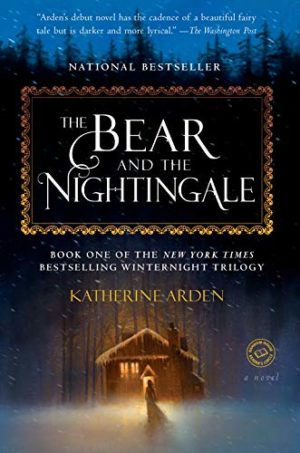
After Vasilisa’s mother dies, her father goes to Moscow and brings home a new wife. Fiercely devout, city-bred, Vasilisa’s new stepmother forbids her family from honoring the household spirits. The family acquiesces, but Vasilisa is frightened, sensing that more hinges upon their rituals than anyone knows.
And indeed, crops begin to fail, evil creatures of the forest creep nearer, and misfortune stalks the village. All the while, Vasilisa’s stepmother grows ever harsher in her determination to groom her rebellious stepdaughter for either marriage or confinement in a convent.
As danger circles, Vasilisa must defy even the people she loves and call on dangerous gifts she has long concealed—this, in order to protect her family from a threat that seems to have stepped from her nurse’s most frightening tales.”
Review:
Folklore is a hard thing to capture in a book. Sure, you can map out the plot, characters, and setting, but the fundamental allure is lost in translation because folklore is vague and conflicting, rather than confined to neat plotlines and numbered pages. The Bear and the Nightingale by Katherine Arden indeed loses some of this quality and augments it with a detailed web of political alliances and character relationships far too precise to be mistaken for folklore; however, it manages to balance these to create something that feels both comfortable and refreshing.
Worldbuilding is one of the first things that I noticed about the book. While the description led me to think that this would be a quaint story, I was pleasantly surprised to find that this was not the case. The struggle of an isolated village is tied to the politics of the faraway capital in a series of complex maneuvers, and each side character has well-defined and unique motivations and worldviews that help bring these even closer.
This, in particular, is helped by the multiple perspectives, which allow each character to share their view. In fact, most of the book is spent on these side stories, and surprisingly little is spent on Vasilisa. This choice not only helps create a sense of a vast world outside of hers but also emphasizes her strangeness and the “folklore-like” qualities of her story. Much of her story is told by side characters rather than herself, and by creating this disconnect between her and the narration, she takes on an ethereal and mysterious presence that would otherwise be difficult to convey through her own childlike perspective.
And besides this, the beautiful writing also beautifully reflects the mystic nature by lingering on certain aspects, like the bone-deep chill of winter, and glossing over others, such as most of Vasilisa’s childhood.
However, this book does struggle in terms of creating a satisfying conclusion that ties together all of its plot threads. While it is expected that some wouldn’t be fully addressed, given that there are two more books in the series, it is still disappointing because the climax and conclusion were clearly rushed and messy, as if the author had not planned how to end it, but needed to do so before the book went on for too long. So, while it serves as a good premise for the series, it doesn’t stand by itself as well.
Overall, though, Arden creates a wonderful new take on what feels familiar, weaving a medieval tapestry of familiar story beats from childhood stories and the lush, and detailed forest of images.
Revenge and “Good for her”
Revenge is pretty straightforward, but what does “Good for Her” mean? “Good for her” is a trope in movies, often suspenseful ones, in which a woman seeks revenge on a man who has harmed her. Think Gone Girl or Promising Young Woman. The bitter coldness often embodied by these characters brings to mind frostbite, a slow killer, or even the howling winds which rage against anyone who dares test it.
Sadie by Courtney Summers
Goodreads description:
“A missing girl on a journey of revenge. A Serial-like podcast following the clues she’s left behind. And an ending you won’t be able to stop talking about.
Sadie hasn’t had an easy life. Growing up on her own, she’s been raising her sister Mattie in an isolated small town, trying her best to provide a normal life and keep their heads above water.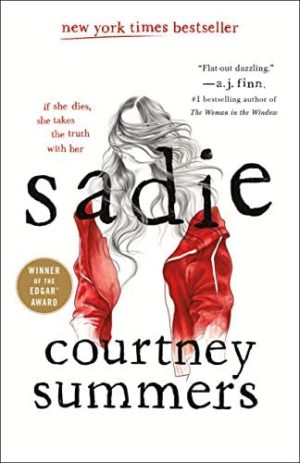
But when Mattie is found dead, Sadie’s entire world crumbles. After a somewhat botched police investigation, Sadie is determined to bring her sister’s killer to justice and hits the road following a few meager clues to find him.
When West McCray – a radio personality working on a segment about small, forgotten towns in America – overhears Sadie’s story at a local gas station, he becomes obsessed with finding the missing girl. He starts his own podcast as he tracks Sadie’s journey, trying to figure out what happened, hoping to find her before it’s too late.
Courtney Summers has written the breakout book of her career. Sadie is propulsive and harrowing and will keep you riveted until the last page.”
Review:
I guess it is a bit disingenuous of me to describe Sadie by Courtney Summers as a “good for her” story because it’s not. Before reading the book, I had expected it to be triumphant or violently gleeful, but I was wrong. It never could have been, because unlike in many other revenge stories, Sadie is not a vengeful person.
In fact, Sadie’s defining trait might be her sense of responsibility. In fact, sometimes it is easy to forget how young she is. Other times, it is painfully clear. It is her responsibility, which was drilled into her while she was far too young, that drives her. Even Sadie’s vengeance is not done for herself, but rather on behalf of her sister, and for me, it made this book so compelling and all the more heartbreaking.
Sadie’s narration itself also drives this home, because it is deeply influenced by how she has given and continues to give her life away for her sister. One of the most interesting types of narrators, to me, is the kind that is a bit detached from themselves and their own pain and this definitely describes Sadie. It is not that she doesn’t care, necessarily, but she just describes herself in an oddly clinical way, never allowing herself to think too much about the depth of her own feelings.
And it is not just the tone of the words or the plot, but the very structure of the story as well, that creates such an elusive character. By switching between Sadie’s narration and the podcast’s transcripts, the author is able to reflect on Sadie’s character and relationships without having her be the one to do so. As each character weighs in on the story, a more complex picture of Sadie and her relationships is created, and while none of their interpretations are dead wrong, they are not all the way true. In this book, everyone is a little blind and every truth has a little bit of a lie in it, no matter how reliable it may appear at first.
It definitely isn’t a book that I’d recommend to anyone, because the subject matter can be very dark. However, it is not just a book that is dark and gritty just for the sake of it. In Sadie, everything from the dilapidated towns on their last legs to the new shiny cities is tied together by an underlying rot, but at the same time, it gives the reader the occasional glimpses of hope and emotion that allude to there being so much more to it all, and this is why I kept on reading.
I hope that you are able to find a good book to check out this winter! Come back soon for some spring book reviews.
